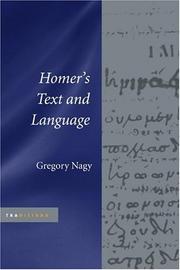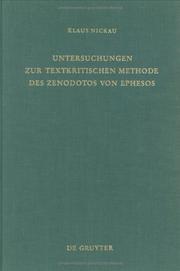| Listing 1 - 4 of 4 |
Sort by
|
Book

ISBN: 9781477316047 1477316043 1477316035 1477316051 9781477316030 Year: 2018 Publisher: Austin
Abstract | Keywords | Export | Availability | Bookmark
 Loading...
Loading...Choose an application
- Reference Manager
- EndNote
- RefWorks (Direct export to RefWorks)
Before they were written down, the poems attributed to Homer were performed orally, usually by rhapsodes (singers/reciters) who might have traveled from city to city or enjoyed a position in a wealthy household. Even after the Iliad and the Odyssey were committed to writing, rhapsodes performed the poems at festivals, often competing against each other. As they recited the epics, the rhapsodes spoke as both the narrator and the characters. These different acts--performing the poem and narrating and speaking in character within it--are seldom studied in tandem. Homer in Performance breaks new ground by bringing together all of the speakers involved in the performance of Homeric poetry: rhapsodes, narrators, and characters.The first part of the book presents a detailed history of the rhapsodic performance of Homeric epic from the Archaic to the Roman Imperial periods and explores how performers might have shaped the poems. The second part investigates the Homeric narrators and characters as speakers and illuminates their interactions. The contributors include scholars versed in epigraphy, the history of art, linguistics, and performance studies, as well as those capable of working with sources from the ancient Near East and from modern Russia. This interdisciplinary approach makes the volume useful to a spectrum of readers, from undergraduates to veteran professors, in disciplines ranging from classical studies to folklore.
E-books --- Epic poetry, Greek - History and criticism - Theory, etc. --- Performing arts - Appreciation - Greece --- Oral interpretation of poetry --- Oral tradition - Greece --- Homer - Criticism, Textual --- Epic poetry, Greek --- Performing arts --- Oral tradition --- Homer --- Oral interpretation of poetry. --- Oral tradition. --- Performanz --- Rezeption. --- Sprechtheater. --- History and criticism --- Theory, etc. --- Appreciation --- Homer. --- Homerus, --- Criticism, Textual. --- Greece.

ISBN: 0252029836 9780252029837 Year: 2004 Publisher: Urbana: University of Illinois press,
Abstract | Keywords | Export | Availability | Bookmark
 Loading...
Loading...Choose an application
- Reference Manager
- EndNote
- RefWorks (Direct export to RefWorks)
Epic poetry, Greek --- Greek language --- Criticism, Textual --- Etymology --- Homer --- Criticism, Textual. --- Etymology. --- Homeros --- Homère --- Homerus --- Hóiméar --- Hūmīrūs --- Gomer --- Omir --- Omer --- Omero --- Ho-ma --- Homa --- Homérosz --- האמער --- הומירוס --- הומר --- הומרוס --- هومر --- هوميروس --- 荷马 --- Ὅμηρος --- Гамэр --- Hamėr --- Омир --- Homero --- 호메로스 --- Homerosŭ --- Homērs --- Homeras --- Хомер --- ホメーロス --- ホメロス --- Гомер --- Homeri --- Hema --- Pseudo-Homer --- Pseudo Omero --- Language --- Epic poetry, Greek Criticism, Textual --- Epic poetry, Greek - Criticism, Textual --- Greek language - Etymology --- Homer - Criticism, Textual --- Homer - Language
Book
ISBN: 1282934015 9786612934018 3110216809 3110195437 9783110216806 9783110195439 Year: 2010 Publisher: Berlin Boston
Abstract | Keywords | Export | Availability | Bookmark
 Loading...
Loading...Choose an application
- Reference Manager
- EndNote
- RefWorks (Direct export to RefWorks)
The Homeric Questions of the Neoplatonic philosopher Porphyry (3rd cent. CE) is an important work in the history of Homeric criticism. In contrast to the philosopher's allegorical readings of Homer in De Antro and De Styge, in the Homeric Questions Porphyry solves problemata by applying the dictum that "the poet explains himself". Based on a new collation of the manuscripts, this edition of Porphyry's Homeric Questions on the Iliad is the first since 1880. The preface contains sections on Porphyry's life and works, the manuscript tradition of the text, scholarship on the Homeric Questions, and the principles of this edition. The editor has eliminated much that had been wrongly attributed to Porphyry on stylistic grounds and has constructed text according to a strict distinction between extracts of the Homeric Questions, epitomes of the extracts, and Porphyrian scholia - all confusingly interspersed in the old text. A facing English translation at last makes this text accessible to the Greek-less reader. The commentary explains Porphyry's arguments and the editor's textual decisions. The editor sheds new light on Porphyry's use of the dictum that "the poet explains himself", by differentiating it from that of Alexandria textual critics.
Homer --Criticism, Textual. --- Homer. --Iliad. --- Porphyry, --ca. 234-ca. 305. --Questiones Homericae. --- Languages & Literatures --- Greek & Latin Languages & Literatures --- Greek poetry --- History and criticism. --- Homer --- Homer. --- Porphyry, --- Criticism, Textual. --- Homeros --- Homère --- Hóiméar --- Hūmīrūs --- Gomer --- Omir --- Omer --- Omero --- Ho-ma --- Homa --- Homérosz --- האמער --- הומירוס --- הומר --- הומרוס --- هومر --- هوميروس --- 荷马 --- Ὅμηρος --- Гамэр --- Hamėr --- Омир --- Homero --- 호메로스 --- Homerosŭ --- Homērs --- Homeras --- Хомер --- ホメーロス --- ホメロス --- Гомер --- Homeri --- Hema --- Pseudo-Homer --- Pseudo Omero --- Homerus --- Greece /Philosophy. --- Neo-Platonism. --- Porphyrios.

ISBN: 3110018276 9783110018271 Year: 1977 Volume: 16 Publisher: Berlin de Gruyter
Abstract | Keywords | Export | Availability | Bookmark
 Loading...
Loading...Choose an application
- Reference Manager
- EndNote
- RefWorks (Direct export to RefWorks)
Epic poetry, Greek --- Criticism, Textual --- Zenodotos, --- Homer --- -Greek epic poetry --- Epic poetry, Classical --- Greek poetry --- Zenodotos of Ephesus --- -Criticism, Textual --- Criticism, Textual. --- Zēnodotos, --- -Hóiméar --- Hūmīrūs --- Homeros --- Homerus --- Gomer --- Omir --- Omer --- Omero --- Ho-ma --- Homa --- Homérosz --- האמער --- הומירוס --- הומר --- הומרוס --- هومر --- هوميروس --- 荷马 --- Ὅμηρος --- Гамэр --- Hamėr --- Омир --- Homero --- 호메로스 --- Homerosŭ --- Homērs --- Homeras --- Хомер --- ホメーロス --- ホメロス --- Гомер --- Homeri --- Hema --- Pseudo-Homer --- Pseudo Omero --- -Homer --- Homère --- Zēnodotos, --- Zenodot, --- Hóiméar --- Epic poetry, Greek Criticism, Textual --- Epic poetry, Greek - Criticism, Textual --- Zenodotos, - of Ephesus, - ca. 325-260, B.C. --- Homer - Criticism, Textual
| Listing 1 - 4 of 4 |
Sort by
|

 Search
Search Feedback
Feedback About UniCat
About UniCat  Help
Help News
News